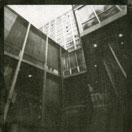KATALOG 18.3
The photographer Mikkel Seeberg has
been to Italy, just as earlier generations
of artists have done, and has been
inspired by the atmosphere of the country. His photographs were made with a
pinhole camera, which means that the
entire image is rendered equally sharply.
The image proportions are also different to those of a 'normal' photographic
image, and these qualities give a poetic
and painterly result. For the prints from
his negatives Seeberg has also used
another old and simple technique - the
gum bichromate print. Clear, brief information about pinhole cameras and the
gum bichromate process is given at the
back of the book.
It may perhaps sound as though Seeberg is both nostalgic and sentimental
because of his choice of technique and
his theme, Italy. This is, however, not the
case, as he has in no way attempted
to produce the sort of romantic image
of the country that might have been
produced in the 1800s. He has chosen
eleven photographs from the three cities
he has dealt with: Florence, Milan and
Bari, which represent respectively the
cultural and economic centres of the
country, and a poor coastal city in the
south. The three cities function as chapters in the book, all of which start with
a short introduction to the place itself.
In the foreword the photographer asks if
the pictures express something innately
different about each place, or if any difference is caused solely by the viewer's
expectations? In other words, he asks
whether it is possible to see, by simply
looking at a photograph from Florence,
that it is an image from a city marked by
a long cultural history, or whether it is
merely an interpretation that the viewer
him/herself makes, based on knowledge
of the source of the motif? This is not a
particularly difficult question to answer,
because as a viewer it is difficult not
to be affected by all the extra information one receives over and above the
photographic image. This slightly artificial
question, however, does not change the
fact that Seeberg has produced some
very poetic and beautiful photographs
from Italy that are more than just views
of three cities. The urban spaces are
allowed, in a rather special way, to speak
for themselves. This is perhaps due to
the fact that the exposure times needed
for a pinhole camera are so long that the
photographer does not have complete
control over the motif. What is certain,
however, is that it is the combination of
Seeberg's empathy with these places,
together with the possibilities offered by
the photographic medium that has made
this possible. I can only hope that this
young photographer continues exploring
the world's towns and cities, and goes
on using largely forgotten photographic
techniques.
Kristina Lykke Hansen
Lektørudtalelse
Fotobog med en serie anderledes fotos fra tre udvalgte italienske byer:
kulturbyen Firenze, forretningsbyen Milano og provinsbyen Bari.
Billederne har bestemt ikke karakter af traditionelle turistfotos. det
er kunstfotos optaget med et hjemmelavet hulkamera i sort/hvid, der
giver billederne stor dybdeperspektiv og lavet med gummitryk, der
understøtter den kornede overflade. Ved denne teknik står alle motivets
elementer lige skarpt/uskarpt, og billederne forlenes med denne teknik
med en drømmeagtig, tidløs og diset stemning. Denne fornemmelse
forstærkes af, at der ikke optræder mennesker på billederne.
Overfladerne på bygninger, biler virker lukkede, og billederne tømmes
herved for et direkte eller symbolsk indhold, der kunne give dem
karakter af mening eller antyde en bestemt tendens. Ved første gennemsyn
virker billederne derfor noget stillestående, utilnærmelige og anonyme.
Men ved nærmere betragtning udstråler de alligevel en monumental og
nærmest mystisk ro, der langsomt gløder igennem. Hver af byerne får
hvert sit afsnit med billeder, som MS giver en kort introduktion til.
Hans tilgang til byerne er mere intuitiv end intellektuel. Han har ingen
intention om at sætte byerne ind i en bestemt kontekst eller historisk
dimension. Han ønsker alene at afsøge den magi, som byerne udstråler på
hver sin måde. MS beskriver i et særligt afsnit den anvendte meget
"antidigitale" metode.
Kent Skov
|
